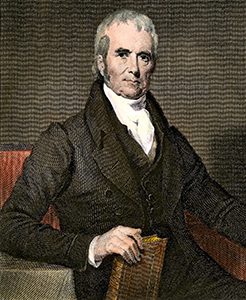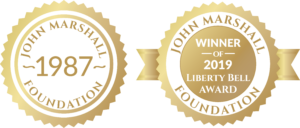The Peaceful Transfer of Power: Precedents and Presidential Oaths
When Thomas Jefferson asked political and personal adversary Chief Justice John Marshall to administer his oath of office after he won the highly contentious presidential election of 1800, it was the first time in US History that power transferred from one political party to another. It was a symbolic – perhaps strategic – and entirely appropriate gesture. In modern terms, it would be like President-Elect Biden asking Justice Gorsuch or Justice Kavanaugh to administer his oath, says Kevin Walsh, University of Richmond Law Professor and President of the John Marshall Center for Constitutional History & Civics (JMC).
Outgoing president John Adams left Washington in the wee hours of March 4, 1801, the day Jefferson took office. He did not attend the inauguration.
Of course, Adams couldn’t Tweet about it, but Marshall did mention that fact in a letter he wrote to Federalist vice–presidential loser, personal friend, and political ally Charles Cotesworth Pinckney. Not one to twaddle, Marshall wrote the scathing-more-than-praising–of–Jefferson letter over the course of inauguration day. He began the letter in the morning, noting the early hour of departure – four o’clock – when Adams had “left the city.” Marshall then put down his pen, left to administer the oath of office, and returned later – picking up his pen again at 4 p.m. – to finish. A Tweet-sized excerpt reads:
“I have administerd the oath to the President. You will before this reaches you see his inauguration speech. It is in the general well judgd & conciliatory. It is in direct terms giving the lie to the violent party declamation which has elected him; but it is strongly characteristic of the general cast of his political theory. With great & sincere esteem, I am dear Sir your Obedt J MARSHALL”
Marshall went on to administer the presidential oath seven more times – to Presidents Jefferson (a second time), Madison (twice), Monroe (twice), John Quincy Adams, and Jackson – all of whom, except for Adams, he disagreed with deeply on important matters of law, politics, and the common good.
While the Constitution does not mandate that anyone in particular administer the presidential oath of office, it has traditionally been administered by the chief justice, beginning with John Adams, except following the death of a sitting president. Walsh says it was Marshall’s consistent practice – more oaths administered than any other chief justice – that established our long tradition of the chief justice administering the presidential oath.
Of course, the oath is only one piece of the peaceful transfer of power, and one that comes toward the end of the relay. The John Marshall Center, housed at the Virginia Museum of History & Culture, will be taking a deeper look at “The Peaceful Transfer of Power” and other topics in a new digital resource series called PopCiv that will connect current events and popular culture to constitutional history.

Look for the John Marshall Center for Constitutional History & Civics’ new series,
PopCiv, that will connect current events and popular culture to constitutional history.
“Our culture craves a better understanding of the Constitution and a historical perspective to provide context for what is happening today” says Caroline Legros, JMC Director of Education & Programs. The series is in response to educators looking for quick conversation starters, FAQs, links, and primary source documents to supplement their own history and social studies curriculum. The new resources will be housed on JMC’s website, www.johnmarshallcenter.org beginning Monday, January 18, and are designed for the classroom as well as the kitchen table.
As our country tries to make sense of unprecedented times, and as parents and civics teachers guide conversations about insurrection, sedition, and inauguration, the John Marshall Center is looking to history for perspective, answers, and sometimes more questions. What are yours? We would like to include them in PopCiv.






 JMC 2021
JMC 2021